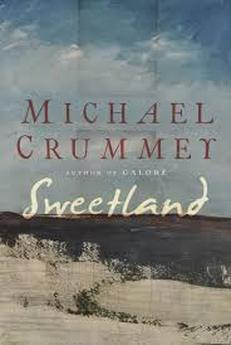 SWEETLAND SWEETLAND By Michael Crummey Doubleday Canadan, 2014 Arguably, there’s no worse time to recommend a novel than right after it’s been shortlisted for the Governor General’s literary award—what words can the reviewer add to the many accolades already swarming the work? Michael Crummey’s newest novel, Sweetland, follows on the heels of the Commonwealth Writers’ Prize-winning Galore (2009). It’s a fitting follow-up: like Galore, Sweetland fuses cultural norms and folklore, infuses Newfoundland’s realpolitik with elements of the supernatural. The novel’s setting is the fictional Newfoundland island of Sweetland; its eponymous hero, Moses Sweetland, is the last holdout blocking a government resettlement package which requires all island residents to sign on to the deal. At first, the eccentric Sweetland is moved by neither pleas nor threats from friends and neighbours. Ultimately, however, he is left alone on the island, and the tale becomes one of survival. Crummey is a master of his craft: the narrative is packed with dialogue that rings with black humour—his characters’ voices, particularly that of Sweetland, are redolent of coastal culture while avoiding clichés. But it’s the novel’s slow descent into the supernatural that strikes bone-deep. Sweetland reminded me of Wayne Johnston’s beautiful The Custodian of Paradise, in which the journalist Sheilagh Fielding retreats to a deserted Newfoundland island to sort through her memories, finding instead the terror of loneliness. Isolation, while an attractive concept in the abstract, can spawn madness in reality; finally left to his own devices on the deserted island, Sweetland plumbs its depths. He begins to see things, hear things. These passages (lights in windows, figures in the dark) feel all the more chilling for Sweetland’s cranky pragmatism. At its heart, Sweetland is about identity. How much do we belong to the land? When are we allowed to cut loose? Simply by staying, Moses Sweetland has tied his identity to that of the island:
Later, however, when survival has taken a bitter toll, Sweetland finds himself in front of a photograph of his Uncle Clar, poised forever in youth, and sees himself,
Sweetland is far from sweet—it is salt-rimed and haunting, a compelling portrait that has earned its accolades. Julienne Isaacs is a Winnipeg writer and reviewer. She is books editor for Rhubarb magazine and staff writer for The Town Crier, The Puritan’s blog. Follow her on twitter at @isaacs_julienne.
|
RUSTY RECOMMENDS
In the spirit of supporting writing—especially writing that's off the radar or under appreciated—we want to know what you are excited about reading and what you think we should be reading. Your recommendations should be paragraph length (approximately 250 to 300 words) and should briefly summarize the book and detail why you are recommending it or why you think others should read it. Send our reviews editor Aaron Schneider your recommendations of Canadian and International fiction and poetry. Please write "Rusty Recommends" in the subject line. Include your (250 to 300 word) recommendation, name, and a link to your website, blog, or social media site (if you have one). Selected recommendations will be posted on our website. We will contact you if your recommendation is selected for publication. There is no payment for publication of Rusty Recommends. Archives
July 2015
Categories
All
Rusty Recommends Editor:
Dr. Aaron Schneider completed a PhD. in Canadian Literature at Western University where he currently teaches courses in public speaking, political rhetoric and Canadian Literature. He is excited about bringing together his interests in World and Canadian Literature. He is the co-founder and co-editor of The Rusty Toque and Western's online student journal Occasus. |

 RSS Feed
RSS Feed
